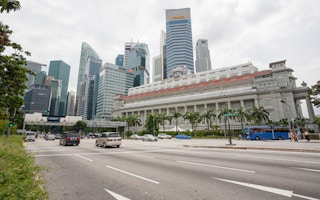By 2050, nearly three-quarters of the global population will live in cities. This is one of the biggest sustainability challenges and opportunities facing humanity. This week I’ve had the privilege of discussing this megatrend at the World Cities Summit in Singapore with city leaders and other key voices on urban development and sustainability.
To continue reading, subscribe to Eco‑Business.
There's something for everyone. We offer a range of subscription plans.
- Access our stories and receive our Insights Weekly newsletter with the free EB Member plan.
- Unlock unlimited access to our content and archive with EB Circle.
- Publish your content with EB Premium.
As I said today in the Summit’s Opening Plenary, my view is clear: if we don’t make cities sustainable, the world will not be sustainable. This is our call to action that will require all stakeholders working together.
Singapore couldn’t be a more apt location for these discussions. Asia is home to a significant number of the world’s largest and fastest growing cities, and in many of these cities resources are being stretched to the limit. This isn’t the case in Singapore. Singapore is a showcase for smart solutions to sustainability and resource efficiency challenges, such as state-of-the-art water management technology allowing wastewater to be collected and reused to produce drinking water, and electronic road pricing to help manage road congestion. Singapore is also working closely with businesses in addressing these challenges, such as a collaboration with Siemens to identify CO2 reduction opportunities in transport, housing and IT.
“
This collaborative approach with business is key – and we at the World Business Council for Sustainable Development believe that businesses are a vital player in ensuring that a sustainable future can be achieved for urban areas all over the planet
This collaborative approach with business is key – and we at the World Business Council for Sustainable Development (WBCSD) believe that businesses are a vital player in ensuring that a sustainable future can be achieved for urban areas all over the planet.
A key question asked in today’s session at the World Cities Summit was: ‘Can cities create their own sustainable pathways?’ In my view, they absolutely can. Recently, WBCSD’s Urban Infrastructure Initiative (UII) released a report which studied ten cities and their sustainability goals. Six of the cities were in Asia – India, China and Japan – reflecting our desire to focus on this rapidly developing continent. The UII project explored how city leaders, such as those attending the World Cities Summit Mayors’ Forum, can engage with businesses early in the planning process to tap into their expertise to identify sustainable infrastructure solutions. For cities to become efficient and resilient, this dialogue is crucial.
Back in April we discussed here in Eco-Business the city of Yixing, which wants to be China’s ‘demonstration city for scientific and sustainable development’. By bringing together political leadership with the knowledge of ‘on-the-ground’ businesses, sustainable initiatives such as a green transport network are now being taken forward.
We see sustainable urban development as a major focus of the WBCSD’s Action2020 initiative. Action2020 is the key global business platform for driving action on sustainable development. It is a science-based action plan that seeks to engage companies across the globe to implement innovative and scalable business solutions.
The Action2020 plan identifies nine priority areas for the sustainable development of our planet and its societies. For each priority area, a societal “must-have” target is set based on scientific fact. These targets include halting and reversing damage of land and marine ecosystems, addressing rising CO2 and other greenhouse gas emissions and ensuring societies move toward environmentally and socially sustainable agricultural systems.
Take the issue of water. Today, I and my fellow panel of speakers highlighted the need to focus on our global water issues. Sustainable water management is one of Action 2020’s Priority Areas as water scarcity and quality risks are confronting businesses and communities all around the world. Business can be a key provider of solutions for more efficient and effective water management. These solutions can help ensure that both the infrastructure of cities is utilized more efficiently and that money saved can be used in the local economy to ensure the growth and prosperity of a city can be sustained.
What the World Cities Summit has highlighted to us all is that there is no time left for inaction. Rapid urbanisation, climate change and resource scarcity are real issues with us today.
We must capture the enormous win-win opportunity to drive transformational global action through collaboration at the city level – particular between municipal governments and leading private sector solutions providers. Cities win by getting practical, cost-effective solutions to realise their ambitious sustainability visions. Leading businesses will win through unlocking the markets for innovative new solutions that will be essential for delivering transformational change.
We are making this win-win a reality through Action2020 and we would like you to join us.















